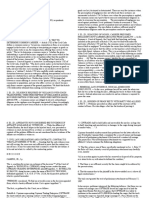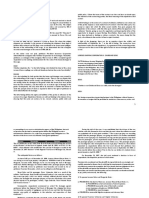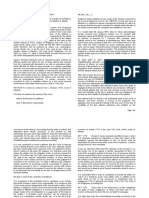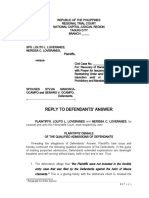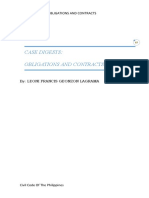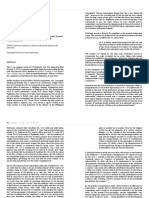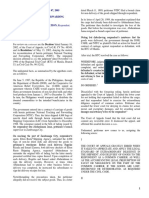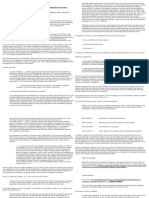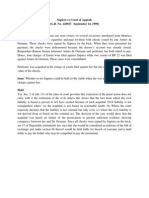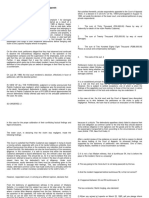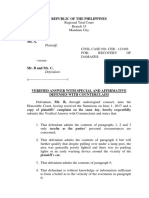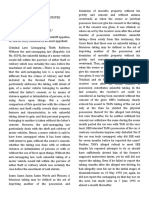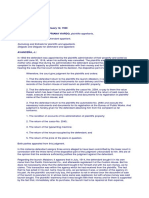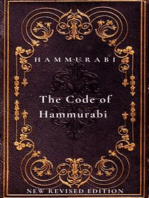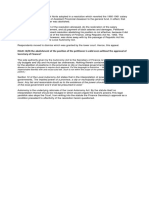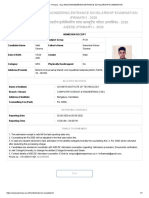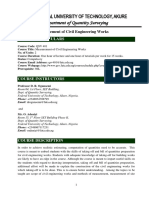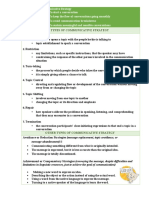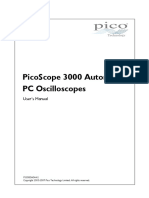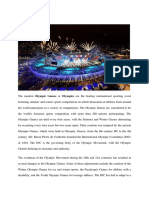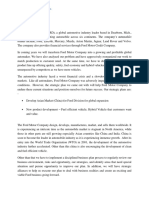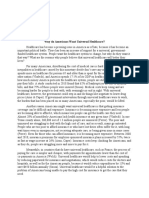SAPIERA
SAPIERA
Uploaded by
Albert Caranguian0 ratings0% found this document useful (0 votes)
32 views2 pagesThe document summarizes a case involving whether a store owner can be held civilly liable for checks that were dishonored even though she was acquitted of criminal charges for the same checks. It finds that yes, she can be held civilly liable as she signed the back of the checks without indication of how she was bound, making her an indorser. Her acquittal in criminal court did not erase her civil liability. The dismissal was due to insufficient evidence, not a finding that the underlying facts did not exist.
Original Description:
SAPIERA
Copyright
© © All Rights Reserved
Available Formats
DOCX, PDF, TXT or read online from Scribd
Share this document
Did you find this document useful?
Is this content inappropriate?
Report this DocumentThe document summarizes a case involving whether a store owner can be held civilly liable for checks that were dishonored even though she was acquitted of criminal charges for the same checks. It finds that yes, she can be held civilly liable as she signed the back of the checks without indication of how she was bound, making her an indorser. Her acquittal in criminal court did not erase her civil liability. The dismissal was due to insufficient evidence, not a finding that the underlying facts did not exist.
Copyright:
© All Rights Reserved
Available Formats
Download as DOCX, PDF, TXT or read online from Scribd
Download as docx, pdf, or txt
0 ratings0% found this document useful (0 votes)
32 views2 pagesSAPIERA
SAPIERA
Uploaded by
Albert CaranguianThe document summarizes a case involving whether a store owner can be held civilly liable for checks that were dishonored even though she was acquitted of criminal charges for the same checks. It finds that yes, she can be held civilly liable as she signed the back of the checks without indication of how she was bound, making her an indorser. Her acquittal in criminal court did not erase her civil liability. The dismissal was due to insufficient evidence, not a finding that the underlying facts did not exist.
Copyright:
© All Rights Reserved
Available Formats
Download as DOCX, PDF, TXT or read online from Scribd
Download as docx, pdf, or txt
You are on page 1of 2
SAPIERA vs CA G.R. No.
128927, September 14, 1999
Thursday, January 29, 2009 Posted by Coffeeholic
Writes
Labels: Case Digests, Commercial Law Issue: Can petitioner be required to pay civil indemnity to
private respondent after trial court had acquitted her of
Facts: On several occasions, petitioner Sapiera, a sari- criminal charges?
sari store owner, purchased from Monnico Mart certain
grocery items, mostlycigarettes, and paid for them with
checks issued by one Arturo de Guzman. These checks Held: Yes. It is undisputed that the four (4) checks issued
were signed at the back by the petitioner. by De Guzman were signed by petitioner at the back
without any indication as to how she should be bound
When presented for payment, the checks thereby and, therefore, she is deemed to be an indorser
were dishonored because the drawer’s account was thereof. The NIL clearly provides – Sec. 17. Construction
already closed. Private respondent Roman Sua informed where instrument is ambiguous. --- Where the language of
De Guzman and petitioner about the dishonor but both the instrument isambiguous, or there
failed to pay the value of the checks. Hence, four (4) are admissions therein, the following rules of
charges of estafa were filed against petitioner construction apply: x x x (f) Where a signature is so placed
but consequently she was acquitted for insufficiency of upon the instrument that it is not clear in what capacity the
evidence but the court a quo did not rule on whether she person making the same intended to sign, he is deemed
could be held civilly liable for the checks she indorsed to an indorser. x x x
private respondent. On appeal, the respondent court
ordered petitioner to pay private respondent the remaining The dismissal of the criminal cases against petitioner did
P210, P150. After deducting the amount already collected not erase her civil liability since the dismissal was due to
by the latter as civil indemnity in the criminal cases against insufficiency of evidence and not from a declaration from
De Guzman. Hence, this instant petition. the court that the fact from which the civil action might arise
did not exist. An accused acquitted of estafa may On the other hand, if the driver, by a sudden act of
negligence, and without the owner having reasonable
nevertheless be held civilly liable where the facts opportunity to prevent the act or its continuance, injures a
established by the evidence so warrant. The accused person or violates the criminal law, the owner of the
should be adjudged liable for the unpaid value of the automobile, although present therein at the time the act
was committed, is not responsible, either criminally or
checks signed by her in favor of the complainant.
civilly, therefor. The act complained of must be continued
in the presence of the owner for such a length of time that
the owner, by his acquiescence, makes his driver's acts
4. Facts: On August 13, 1994, the jeepney owned by
his own."
complainant and driven by Edgardo Castillo, plied its
In the case at bar, nowhere does it show that
usual route going to Virac, Catanduanes. While
complainant participated in abetted or even approved the
approaching a blind curve, the jeepney driver occupied
negligent and reckless manner in which his driver
the wrong lane. At the curve, they suddenly saw a parked
maneuvered the vehicle on that blind curve. Hence, the
dump truck and in order to avoid collision driver swerved
warrant of arrest issued by respondent judge was
to the right and accidentally plunged into the river. The
erroneous.
passengers sustained some injuries.
Consequently, a criminal complaint against Castillo and
complainant was filed before the sala of respondent
judge who then issued a warrant for the arrest of both
Castillo and complainant.
Issue: WON complainant can be held criminally liable.
Ruling: It has been held in Chapman v. Underwood (G.R.
No. 9010, March 28, 1914, 27 Phil 374.) "that An owner
who sits in his automobile and permits his driver to
continue in a violation of the law by the performance of
negligent acts, after he has had reasonable opportunity to
observe them and to direct that the driver cease
therefrom, becomes himself responsible for such acts.
You might also like
- Shahani Manticayan - JournalDocument15 pagesShahani Manticayan - JournalRaima Macapundag CabaroNoch keine Bewertungen
- Jacaban Vs PeopleDocument1 pageJacaban Vs PeopleAlbert Caranguian100% (1)
- PNP BlotterDocument54 pagesPNP Blotterkillprey100% (6)
- Accomodation Services 2019Document6 pagesAccomodation Services 2019Bikesh BhailaNoch keine Bewertungen
- Torts Last 2 CasesDocument6 pagesTorts Last 2 CasesRen ConchaNoch keine Bewertungen
- Sapiera Vs Court of AppealsDocument2 pagesSapiera Vs Court of AppealsToni AsistioNoch keine Bewertungen
- 17 CasesDocument18 pages17 CasesMyle Ysobel BayaniNoch keine Bewertungen
- Layugan vs. IACDocument3 pagesLayugan vs. IACAkeem AmistadNoch keine Bewertungen
- Torts Defenses To FortuitousDocument20 pagesTorts Defenses To FortuitousTanya PimentelNoch keine Bewertungen
- Transpo Full TextDocument49 pagesTranspo Full TextGina Portuguese GawonNoch keine Bewertungen
- Remedios Nota Sapiera VsDocument3 pagesRemedios Nota Sapiera VsKareen BaucanNoch keine Bewertungen
- Transpo Full TextDocument50 pagesTranspo Full TextGina Portuguese GawonNoch keine Bewertungen
- 164 Nota Sapiera V CADocument12 pages164 Nota Sapiera V CATon RiveraNoch keine Bewertungen
- 158053-1915-De La Riva v. Salvador20180320-1159-11ciptd PDFDocument6 pages158053-1915-De La Riva v. Salvador20180320-1159-11ciptd PDFGael MoralesNoch keine Bewertungen
- Pilapil V CaDocument3 pagesPilapil V Cajdz1988Noch keine Bewertungen
- LIM vs. CA G.R. No. 125817Document2 pagesLIM vs. CA G.R. No. 125817Emmanuel Alejandro YrreverreIiiNoch keine Bewertungen
- Provident Insurance vs. Ca FactsDocument39 pagesProvident Insurance vs. Ca FactsCrestu JinNoch keine Bewertungen
- Cases 1.19 Part 1Document29 pagesCases 1.19 Part 1Anne Ausente BerjaNoch keine Bewertungen
- Torts & Damges Digested CasesDocument19 pagesTorts & Damges Digested CasesKarl Jason JosolNoch keine Bewertungen
- Pacis, Baluyot, Reyes & de Leon For Petitioner. The Solicitor General For RespondentsDocument20 pagesPacis, Baluyot, Reyes & de Leon For Petitioner. The Solicitor General For RespondentsApril Ann Sapinoso Bigay-PanghulanNoch keine Bewertungen
- No. L-29640. June 10, 1971. Guillermo Austria, Petitioner, vs. The Court of Appeals (Second Division), PACIFICO ABAD and MARIA G. ABAD, RespondentsDocument3 pagesNo. L-29640. June 10, 1971. Guillermo Austria, Petitioner, vs. The Court of Appeals (Second Division), PACIFICO ABAD and MARIA G. ABAD, RespondentsRomy Ian LimNoch keine Bewertungen
- Pacis, Baluyot, Reyes & de Leon For Petitioner. The Solicitor General For RespondentsDocument4 pagesPacis, Baluyot, Reyes & de Leon For Petitioner. The Solicitor General For RespondentsKye GarciaNoch keine Bewertungen
- Paramount Insurance Corporation, Petitioner, vs. Spouses Yves and Maria Teresa Remondeulaz, RespondentsDocument8 pagesParamount Insurance Corporation, Petitioner, vs. Spouses Yves and Maria Teresa Remondeulaz, RespondentsBeltran KathNoch keine Bewertungen
- Reply To Defendants' Answer: Paragraph I.3 of The AnswerDocument6 pagesReply To Defendants' Answer: Paragraph I.3 of The AnswerHaroldRamosNoch keine Bewertungen
- Martin Badong, Jr. For Petitioner. Eufronio K. Maristela For Private RespondentDocument2 pagesMartin Badong, Jr. For Petitioner. Eufronio K. Maristela For Private RespondentMay ChanNoch keine Bewertungen
- Santos v. People DoneDocument6 pagesSantos v. People DoneSunflower RanilopNoch keine Bewertungen
- First Division: Syllabus SyllabusDocument7 pagesFirst Division: Syllabus SyllabusGael MoralesNoch keine Bewertungen
- Case Digests: Obligations and ContractsDocument90 pagesCase Digests: Obligations and ContractsLeoni Francis LagramaNoch keine Bewertungen
- ScriptDocument5 pagesScriptAnonymous 659sMW8Noch keine Bewertungen
- Sapiera v. Court of Appeals, G.R. No. 128927, September 14, 1999Document8 pagesSapiera v. Court of Appeals, G.R. No. 128927, September 14, 1999Krister VallenteNoch keine Bewertungen
- Sweet Lines Vs Teves: Supreme CourtDocument6 pagesSweet Lines Vs Teves: Supreme CourtKris OrenseNoch keine Bewertungen
- G.R. No. 153563 February 07, 2005 National Trucking and Forwarding CORPORATION, Petitioner, Lorenzo Shipping Corporation, RespondentDocument3 pagesG.R. No. 153563 February 07, 2005 National Trucking and Forwarding CORPORATION, Petitioner, Lorenzo Shipping Corporation, RespondentWonder WomanNoch keine Bewertungen
- ProvRem #13 Perla Compania de Seguros Inc. v. Ramolete PDFDocument7 pagesProvRem #13 Perla Compania de Seguros Inc. v. Ramolete PDFKier Christian Montuerto InventoNoch keine Bewertungen
- Sumiog Transpo DigestDocument22 pagesSumiog Transpo DigestDon SumiogNoch keine Bewertungen
- Calvo v. UCPB General Insurance (148496)Document3 pagesCalvo v. UCPB General Insurance (148496)Josef MacanasNoch keine Bewertungen
- Hector L. Fernandez For Petitioner. Domingo Quibranza and Vicente A. Quibranza For Private RespondentsDocument57 pagesHector L. Fernandez For Petitioner. Domingo Quibranza and Vicente A. Quibranza For Private RespondentsAna leah Orbeta-mamburamNoch keine Bewertungen
- Pal 96Document17 pagesPal 96Natalio Jr RongcalesNoch keine Bewertungen
- REMEDIOS NOTA SAPIERA vs. COURT OF APPEALS and RAMON SUA NegoDocument1 pageREMEDIOS NOTA SAPIERA vs. COURT OF APPEALS and RAMON SUA NegoAlexir MendozaNoch keine Bewertungen
- REMEDIOS NOTA SAPIERA Vs SuaDocument1 pageREMEDIOS NOTA SAPIERA Vs SuaAlexir MendozaNoch keine Bewertungen
- Sapiera Vs Court of AppealsDocument1 pageSapiera Vs Court of AppealsThrees SeeNoch keine Bewertungen
- Heirs of The Teodoro JR V CaDocument5 pagesHeirs of The Teodoro JR V CaTrishalyVienBaslotNoch keine Bewertungen
- Transpo Set 3 Full CaseDocument41 pagesTranspo Set 3 Full CaseANA ANNoch keine Bewertungen
- NIL Part IVDocument10 pagesNIL Part IVTriccie MangueraNoch keine Bewertungen
- 15 Servando Vs Steam NavigationDocument6 pages15 Servando Vs Steam NavigationChiang Kai-shekNoch keine Bewertungen
- Supreme Court: Chipeco & Alcaraz, Jr. For Plaintiff-Appellee. Ang, Atienza & Tabora For Defendant-AppellantDocument9 pagesSupreme Court: Chipeco & Alcaraz, Jr. For Plaintiff-Appellee. Ang, Atienza & Tabora For Defendant-Appellantcarl dianneNoch keine Bewertungen
- Sample AnswerDocument6 pagesSample AnswerAlexandra Nicole Manigos BaringNoch keine Bewertungen
- Adorable Vs CADocument5 pagesAdorable Vs CAHariette Kim Tiongson0% (1)
- 06152024-176-Shewaram v. Philippine Air Lines, IncDocument4 pages06152024-176-Shewaram v. Philippine Air Lines, Incmatthewevan.esteves.mNoch keine Bewertungen
- Transpo CaseDocument21 pagesTranspo CaseEthyl Mae ValdrizNoch keine Bewertungen
- People Vs TanDocument9 pagesPeople Vs TanMaria Danice AngelaNoch keine Bewertungen
- Transpo CasesDocument38 pagesTranspo CasesAllenMarkLuperaNoch keine Bewertungen
- Charm Promotions, Ltd. v. The Travelers Indemnity Company v. Mel Goldman, Third-Party-Defendants, 489 F.2d 1092, 3rd Cir. (1973)Document8 pagesCharm Promotions, Ltd. v. The Travelers Indemnity Company v. Mel Goldman, Third-Party-Defendants, 489 F.2d 1092, 3rd Cir. (1973)Scribd Government DocsNoch keine Bewertungen
- San Pedro Bus G.R. No. L-6291, April 29, 1954. DecisionDocument6 pagesSan Pedro Bus G.R. No. L-6291, April 29, 1954. DecisionCharisse CruzNoch keine Bewertungen
- E12. SWEET LINE, INC., Petitioner, v. HON. BERNARDO TEVES, Presiding Judge, CFI of Misamis Oriental, Branch VII, LEOVIGILDO TANDOG, JR., and ROGELIO TIRO, Respondents.Document7 pagesE12. SWEET LINE, INC., Petitioner, v. HON. BERNARDO TEVES, Presiding Judge, CFI of Misamis Oriental, Branch VII, LEOVIGILDO TANDOG, JR., and ROGELIO TIRO, Respondents.Ammie AsturiasNoch keine Bewertungen
- Vicente Sy-JucoDocument3 pagesVicente Sy-JucoSyannil VieNoch keine Bewertungen
- G.R. No. 17Document2 pagesG.R. No. 17wjdwbdiwbNoch keine Bewertungen
- Dangwa V. CADocument5 pagesDangwa V. CAMarchini Sandro Cañizares KongNoch keine Bewertungen
- Banco Español-Filipino vs. Palanca., 37 Phil. 921, No. 11390 March 26, 1918Document14 pagesBanco Español-Filipino vs. Palanca., 37 Phil. 921, No. 11390 March 26, 1918carl dianneNoch keine Bewertungen
- Obli Cases For DigestDocument42 pagesObli Cases For DigestJanila BajuyoNoch keine Bewertungen
- Republic of The Philippines Court of Appeals Manila Fifth DivisionDocument4 pagesRepublic of The Philippines Court of Appeals Manila Fifth DivisionKissesNoch keine Bewertungen
- Standard Insurance Co., Inc. vs. CuaresmaDocument6 pagesStandard Insurance Co., Inc. vs. CuaresmaAlexandra Nicole SugayNoch keine Bewertungen
- Heirs of Teodoro Guaring vs. CA, G.R No. 108395, 07 Mar 1997Document9 pagesHeirs of Teodoro Guaring vs. CA, G.R No. 108395, 07 Mar 1997wintergyeolNoch keine Bewertungen
- Transpo - Basco Vs CADocument10 pagesTranspo - Basco Vs CAArjane SamaniegoNoch keine Bewertungen
- People Vs Walpan Ladjaalam y Milapil CrimdigestDocument3 pagesPeople Vs Walpan Ladjaalam y Milapil CrimdigestAlbert CaranguianNoch keine Bewertungen
- Fajardo V People DigestDocument2 pagesFajardo V People DigestAlbert CaranguianNoch keine Bewertungen
- ARNEL SISON y ESCUADRO Vs People of The PhilDocument2 pagesARNEL SISON y ESCUADRO Vs People of The PhilAlbert CaranguianNoch keine Bewertungen
- Case Digest Agote vs. Lorenzo G.R. No. 142675Document1 pageCase Digest Agote vs. Lorenzo G.R. No. 142675Albert CaranguianNoch keine Bewertungen
- Llanto Vs DimaporoDocument1 pageLlanto Vs DimaporoAlbert CaranguianNoch keine Bewertungen
- Aris (Phils.) Inc. vs. NLRC (G.R. No. 905501. August 05, 1991)Document1 pageAris (Phils.) Inc. vs. NLRC (G.R. No. 905501. August 05, 1991)Albert CaranguianNoch keine Bewertungen
- War Against ArchitectureDocument7 pagesWar Against ArchitectureHasan Basri KartalNoch keine Bewertungen
- Creative ConceptDocument16 pagesCreative ConceptReizexen GutierrezNoch keine Bewertungen
- Stefan Rotter: About The ArtistDocument3 pagesStefan Rotter: About The ArtistEvaNoch keine Bewertungen
- Innovation Is Great WorksheetsDocument2 pagesInnovation Is Great WorksheetsAngel Angeleri-priftis.Noch keine Bewertungen
- E Verify ManualDocument61 pagesE Verify Manualejazali_syedNoch keine Bewertungen
- Industry 4.0 - From Vision To ImplementationDocument31 pagesIndustry 4.0 - From Vision To ImplementationThomas BerthelotNoch keine Bewertungen
- HSSC Admission Form 2019Document2 pagesHSSC Admission Form 2019mohammad hamzaNoch keine Bewertungen
- AwardDocument2 pagesAwardnuravssNoch keine Bewertungen
- Q Skills 3 LS TBDocument130 pagesQ Skills 3 LS TBandy50% (8)
- Minutes Faculty MeetingDocument5 pagesMinutes Faculty Meetingjoris sulima100% (3)
- LBP v. Arenas-BanalDocument2 pagesLBP v. Arenas-BanalAntonJohnVincentFriasNoch keine Bewertungen
- AIEESE - Primary - ALL INDIA ENGINEERING ENTRANCE SCHOLARSHIP EXAMINATIONDocument1 pageAIEESE - Primary - ALL INDIA ENGINEERING ENTRANCE SCHOLARSHIP EXAMINATIONGowdaNoch keine Bewertungen
- 660 Factors Affecting Cycling Levels of Service PDFDocument134 pages660 Factors Affecting Cycling Levels of Service PDFAngeles ArgottNoch keine Bewertungen
- QSV 401 - Measurement of Civil Engineering Works: Course ParticularsDocument5 pagesQSV 401 - Measurement of Civil Engineering Works: Course ParticularsEngr AdamsNoch keine Bewertungen
- Skill Based PayDocument2 pagesSkill Based PayAnto PuthusseryNoch keine Bewertungen
- Dominador B. Bustos vs. Antonio G. Lucero-1Document2 pagesDominador B. Bustos vs. Antonio G. Lucero-1Venice Jamaila DagcutanNoch keine Bewertungen
- Information Technology Act, 2000 - TutorialspointDocument1 pageInformation Technology Act, 2000 - TutorialspointKuldeep SinghNoch keine Bewertungen
- Oral Communication - Communicative StrategyDocument2 pagesOral Communication - Communicative StrategyJungkook JeonNoch keine Bewertungen
- Chief Judge Timothy C. Evans Responds To Mayor Lori Lightfoot's Request On Electronic MonitoringDocument6 pagesChief Judge Timothy C. Evans Responds To Mayor Lori Lightfoot's Request On Electronic MonitoringWGN Web DeskNoch keine Bewertungen
- Exhibit 2 - Wayne K. Stensby ReferralDocument48 pagesExhibit 2 - Wayne K. Stensby ReferralLa Isla OesteNoch keine Bewertungen
- PicoScope 3223 3423 Automotive Oscilloscope Users GuideDocument15 pagesPicoScope 3223 3423 Automotive Oscilloscope Users Guiderobert brownNoch keine Bewertungen
- Product: CatalogueDocument92 pagesProduct: CataloguekpbhimaniNoch keine Bewertungen
- OBE Outcome Based Education SystemDocument44 pagesOBE Outcome Based Education SystemZulfiqarNoch keine Bewertungen
- Olympic Games & FULLDocument8 pagesOlympic Games & FULLAnjum Ansh KhanNoch keine Bewertungen
- Executive Summary: Ford Motor Strategic AnalysisDocument20 pagesExecutive Summary: Ford Motor Strategic Analysisအမုန္း က်ိန္စာ100% (1)
- Literature Review - Henry FladungDocument4 pagesLiterature Review - Henry Fladungapi-534365477Noch keine Bewertungen
- Grande Ronde River Creel ReportDocument1 pageGrande Ronde River Creel Reportpaul5851Noch keine Bewertungen











